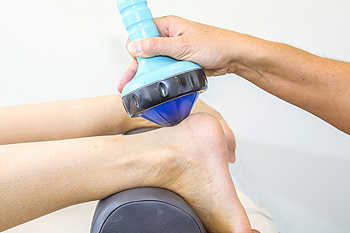 A form of therapy that is referred to as extracorporeal shock wave therapy, which is also known as ESWT, may possibly aid in helping patients with pain associated with tendons. People who experience plantar fasciitis may benefit from this type of treatment. It may promote healing and this may reduce some of the pain and discomfort that is typically associated with this condition. There are generally two forms of this type of treatment. One is referred to as a high-energy shock wave treatment, often including the therapy to be performed in one session. Some patients experience severe pain if this procedure is chosen, and may be administered anesthesia. Low-energy shock wave treatments may consist of being given in three or more sessions and typically causes mild or no pain. If you are experiencing tendon ailments, please speak with a podiatrist if you would like information about shock wave therapy.
A form of therapy that is referred to as extracorporeal shock wave therapy, which is also known as ESWT, may possibly aid in helping patients with pain associated with tendons. People who experience plantar fasciitis may benefit from this type of treatment. It may promote healing and this may reduce some of the pain and discomfort that is typically associated with this condition. There are generally two forms of this type of treatment. One is referred to as a high-energy shock wave treatment, often including the therapy to be performed in one session. Some patients experience severe pain if this procedure is chosen, and may be administered anesthesia. Low-energy shock wave treatments may consist of being given in three or more sessions and typically causes mild or no pain. If you are experiencing tendon ailments, please speak with a podiatrist if you would like information about shock wave therapy.
Shockwave therapy is a treatment commonly used to treat various injuries and conditions, particularly plantar fasciitis in the feet. To learn more, consult with one of our podiatrists from Carolina Foot & Ankle. Our doctors can provide the care you need to keep you pain-free and on your feet.
Shockwave Therapy
Shockwave therapy is a new treatment option designed to treat bone conditions such as tennis elbow, shoulder pain, and others. Shockwave therapy uses high intensity sound waves that are directed to the affected tissues of the body with pinpoint accuracy. The effects are very beneficial, leading to a production of collagen fibers, eliminating inflammation.
Who Benefits from Shockwave?
Shockwave is recommended for patients suffering from heel pain and associated problems. Heel pain is a common condition which can be caused by obesity, overexertion, and spending a substantial amount of time on hard floors with your feet exposed and unsupported.
Fast and Easy
The therapy is actually a simple process that can leave patients feeling better the very next day. Shockwave therapy is not as dramatic as it sounds. It enables more blood flow to effected areas, addressing the source of the problem and allowing treatment to last for a long time.
Treatment & Recovery Time
Shockwave treatment will enable your feet to recover quickly. This is especially important since surgery is not required. It is cost effective and does not require the use of anesthesia. This treatment is a better option to surgery, since it is proven safe.
If you have any questions, please feel free to contact one of our offices located in Huntersville Office | 16419 Northcross Dr Suite A, Huntersville, NC 28078; Mooresvillle Office | 206 Joe Knox Avenue Suite D, Mooresville, NC 28117; and Mountain Island | 10310 Couloak Drive Suite 200, Charlotte, NC 28216 . We offer the newest diagnostic and treatment technologies for all your foot and ankle needs.
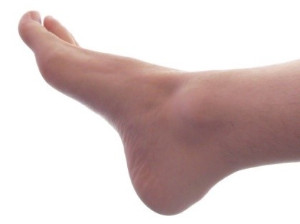 If you experience discomfort and pain on the inside of your foot, you may have what is referred to as tarsal tunnel syndrome. This condition may also be called TTS, and may result from constant overuse of the ankle and foot. Activities that can cause this ailment to develop may include walking, exercising or running and can also occur from a serious injury. The surrounding area may become inflamed as a result of damaged nerves, which may have a negative impact in performing daily activities. Research has shown that early diagnosis and treatment of tarsal tunnel syndrome may accelerate the healing process, which may typically begin with resting the foot. Severe cases of this condition may be treated with orthotics or physical therapy. It’s suggested to speak with a podiatrist as quickly as possible to ensure that a proper diagnosis is performed and the correct treatment options are discussed.
If you experience discomfort and pain on the inside of your foot, you may have what is referred to as tarsal tunnel syndrome. This condition may also be called TTS, and may result from constant overuse of the ankle and foot. Activities that can cause this ailment to develop may include walking, exercising or running and can also occur from a serious injury. The surrounding area may become inflamed as a result of damaged nerves, which may have a negative impact in performing daily activities. Research has shown that early diagnosis and treatment of tarsal tunnel syndrome may accelerate the healing process, which may typically begin with resting the foot. Severe cases of this condition may be treated with orthotics or physical therapy. It’s suggested to speak with a podiatrist as quickly as possible to ensure that a proper diagnosis is performed and the correct treatment options are discussed.
Tarsal tunnel syndrome can be very uncomfortable to live with. If you are experiencing tarsal tunnel syndrome, contact one of our podiatrists of Carolina Foot & Ankle. Our doctors can provide the care you need to keep you pain-free and on your feet.
Tarsal Tunnel Syndrome
Tarsal tunnel syndrome, which can also be called tibial nerve dysfunction, is an uncommon condition of misfiring peripheral nerves in the foot. The tibial nerve is the peripheral nerve in the leg responsible for sensation and movement of the foot and calf muscles. In tarsal tunnel syndrome, the tibial nerve is damaged, causing problems with movement and feeling in the foot of the affected leg.
Common Cause of Tarsal Tunnel Syndrome
The Effects of Tarsal Tunnel Syndrome
A physical exam of the leg can help identify the presence of tarsal tunnel syndrome. Medical tests, such as a nerve biopsy, are also used to diagnose the condition. Patients may receive physical therapy and prescriptive medication. In extreme cases, some may require surgery.
If you have any questions please feel free to contact one of our offices located in Huntersville Office | 16419 Northcross Dr Suite A, Huntersville, NC 28078; Mooresvillle Office | 206 Joe Knox Avenue Suite D, Mooresville, NC 28117; and Mountain Island | 10310 Couloak Drive Suite 200, Charlotte, NC 28216 . We offer the newest diagnostic and treatment technologies for all your foot and ankle needs.
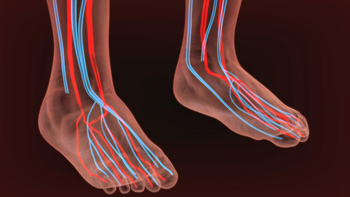 There is a type of nerve disorder that is known as peripheral neuropathy. The purpose of this type of nervous system is to provide a connection between the spinal cord, brain, and the central nervous system to the rest of the body. If these nerves should become damaged, peripheral neuropathy may begin to develop, and this may typically cause symptoms such as tingling in the feet or a loss of feeling. Additional symptoms may include experiencing a sharp pain, low blood pressure, or excessive sweating. There may be common reasons for this ailment to develop, including an inherited trait, an infection or an injury. If you are experiencing a sensation of “pins and needles” in your feet, please consider speaking with a podiatrist to learn what the best course of treatment may be for you.
There is a type of nerve disorder that is known as peripheral neuropathy. The purpose of this type of nervous system is to provide a connection between the spinal cord, brain, and the central nervous system to the rest of the body. If these nerves should become damaged, peripheral neuropathy may begin to develop, and this may typically cause symptoms such as tingling in the feet or a loss of feeling. Additional symptoms may include experiencing a sharp pain, low blood pressure, or excessive sweating. There may be common reasons for this ailment to develop, including an inherited trait, an infection or an injury. If you are experiencing a sensation of “pins and needles” in your feet, please consider speaking with a podiatrist to learn what the best course of treatment may be for you.
Neuropathy
Neuropathy can be a potentially serious condition, especially if it is left undiagnosed. If you have any concerns that you may be experiencing nerve loss in your feet, consult with one of our podiatrists from Carolina Foot & Ankle. Our doctors will assess your condition and provide you with quality foot and ankle treatment for neuropathy.
What Is Neuropathy?
Neuropathy is a condition that leads to damage to the nerves in the body. Peripheral neuropathy, or neuropathy that affects your peripheral nervous system, usually occurs in the feet. Neuropathy can be triggered by a number of different causes. Such causes include diabetes, infections, cancers, disorders, and toxic substances.
Symptoms of Neuropathy Include:
Those with diabetes are at serious risk due to being unable to feel an ulcer on their feet. Diabetics usually also suffer from poor blood circulation. This can lead to the wound not healing, infections occurring, and the limb may have to be amputated.
Treatment
To treat neuropathy in the foot, podiatrists will first diagnose the cause of the neuropathy. Figuring out the underlying cause of the neuropathy will allow the podiatrist to prescribe the best treatment, whether it be caused by diabetes, toxic substance exposure, infection, etc. If the nerve has not died, then it’s possible that sensation may be able to return to the foot.
Pain medication may be issued for pain. Electrical nerve stimulation can be used to stimulate nerves. If the neuropathy is caused from pressure on the nerves, then surgery may be necessary.
If you have any questions, please feel free to contact one of our offices located in Huntersville Office | 16419 Northcross Dr Suite A, Huntersville, NC 28078; Mooresvillle Office | 206 Joe Knox Avenue Suite D, Mooresville, NC 28117; and Mountain Island | 10310 Couloak Drive Suite 200, Charlotte, NC 28216 . We offer the newest diagnostic and treatment technologies for all your foot care needs.
 Many people who are elderly may develop uncomfortable foot conditions as they age. Research has shown there may be many reasons for this to occur. This may include a loss of cushioning in the skin and the nails losing moisture, which may become brittle. If you are contending with poor circulation, any sores that may be present may prove difficult to heal. People of all ages should check their feet regularly to look for cuts, blisters, or ingrown toenails. This is especially true of the older population who may experience difficulty in seeing clearly or bending down. Some patients find it helpful to use a mirror to see the bottom of their feet, or may ask a family member or friend for assistance. It’s important to have your feet measured frequently to ensure the correct size shoe is worn, in addition to wearing socks that fit snugly but are not too tight. If you find conditions such as ingrown toenails, bunions, or corns have developed, it’s suggested to speak with a podiatrist as quickly as possible for correct treatment.
Many people who are elderly may develop uncomfortable foot conditions as they age. Research has shown there may be many reasons for this to occur. This may include a loss of cushioning in the skin and the nails losing moisture, which may become brittle. If you are contending with poor circulation, any sores that may be present may prove difficult to heal. People of all ages should check their feet regularly to look for cuts, blisters, or ingrown toenails. This is especially true of the older population who may experience difficulty in seeing clearly or bending down. Some patients find it helpful to use a mirror to see the bottom of their feet, or may ask a family member or friend for assistance. It’s important to have your feet measured frequently to ensure the correct size shoe is worn, in addition to wearing socks that fit snugly but are not too tight. If you find conditions such as ingrown toenails, bunions, or corns have developed, it’s suggested to speak with a podiatrist as quickly as possible for correct treatment.
Proper foot care is something many older adults forget to consider. If you have any concerns about your feet and ankles, contact one of our podiatrists from Carolina Foot & Ankle. Our doctors can provide the care you need to keep you pain-free and on your feet.
The Elderly and Their Feet
As we age we start to notice many changes in our body, but the elder population may not notice them right away. Medical conditions may prevent the elderly to take notice of their foot health right away. Poor vision is a lead contributor to not taking action for the elderly.
Common Conditions
Susceptible Infections
Diabetes and poor circulation can cause general loss of sensitivity over the years, turning a simple cut into a serious issue.
If you have any questions please feel free to contact one of our offices located in Huntersville Office | 16419 Northcross Dr Suite A, Huntersville, NC 28078; Mooresvillle Office | 206 Joe Knox Avenue Suite D, Mooresville, NC 28117; and Mountain Island | 10310 Couloak Drive Suite 200, Charlotte, NC 28216 . We offer the newest diagnostic and treatment technologies for all your foot and ankle needs.
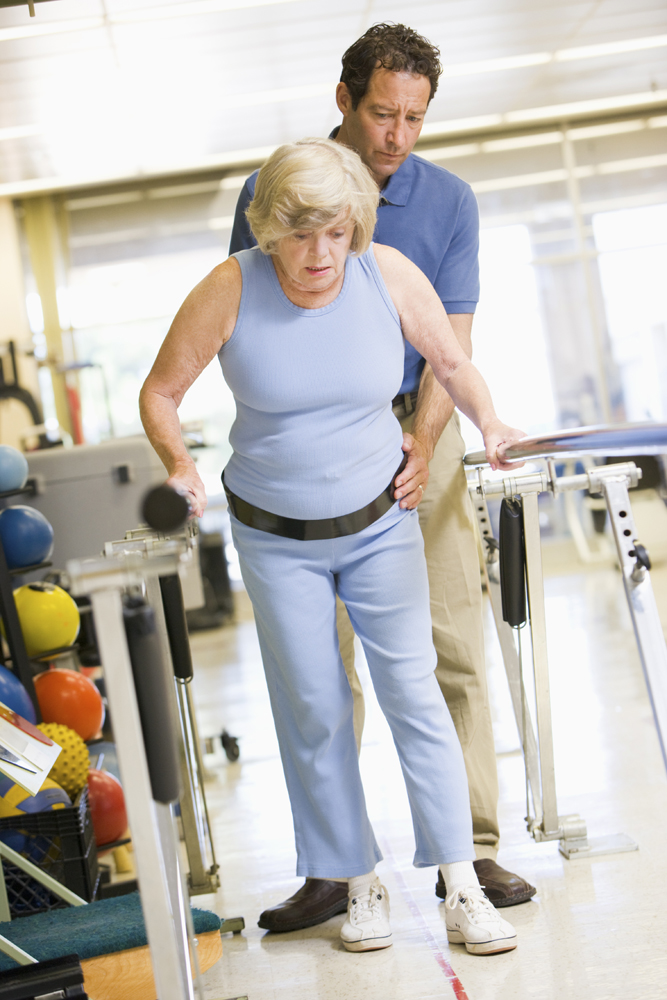 Research has shown that when preventative methods are taken, many falls may be avoided. It is important to learn what these steps are, which may help to reduce the risk of serious injuries from occurring. When people are physically active, the muscles in the feet generally become stronger and this may be able to stop the body from possible falls. There are several safety features that can be utilized in the home including handrails, shower bars, and non-slip rugs. Wearing the correct fitting shoes is typically beneficial in avoiding falls, and should always have adequate support. Many people have their vision checked regularly and this may improve vision, which may prevent tripping. A safe environment is crucial in preventing falls, and will also aid in maintaining a secure feeling. Please consider scheduling a consultation with a podiatrist for additional information about how falling can be prevented.
Research has shown that when preventative methods are taken, many falls may be avoided. It is important to learn what these steps are, which may help to reduce the risk of serious injuries from occurring. When people are physically active, the muscles in the feet generally become stronger and this may be able to stop the body from possible falls. There are several safety features that can be utilized in the home including handrails, shower bars, and non-slip rugs. Wearing the correct fitting shoes is typically beneficial in avoiding falls, and should always have adequate support. Many people have their vision checked regularly and this may improve vision, which may prevent tripping. A safe environment is crucial in preventing falls, and will also aid in maintaining a secure feeling. Please consider scheduling a consultation with a podiatrist for additional information about how falling can be prevented.
Preventing falls among the elderly is very important. If you are older and have fallen or fear that you are prone to falling, consult with one of our podiatrists from Carolina Foot & Ankle. Our doctors will assess your condition and provide you with quality advice and care.
Every 11 seconds, an elderly American is being treated in an emergency room for a fall related injury. Falls are the leading cause of head and hip injuries for those 65 and older. Due to decreases in strength, balance, senses, and lack of awareness, elderly persons are very susceptible to falling. Thankfully, there are a number of things older persons can do to prevent falls.
How to Prevent Falls
Some effective methods that older persons can do to prevent falls include:
Falling can be a traumatic and embarrassing experience for elderly persons; this can make them less willing to leave the house, and less willing to talk to someone about their fears of falling. Doing such things, however, will increase the likelihood of tripping or losing one’s balance. Knowing the causes of falling and how to prevent them is the best way to mitigate the risk of serious injury.
If you have any questions, please feel free to contact one of our offices located in Huntersville Office | 16419 Northcross Dr Suite A, Huntersville, NC 28078; Mooresvillle Office | 206 Joe Knox Avenue Suite D, Mooresville, NC 28117; and Mountain Island | 10310 Couloak Drive Suite 200, Charlotte, NC 28216 . We offer the newest diagnostic and treatment technologies for all your foot care needs.
 If you choose to stand on your feet for the majority of the day, you may be susceptible to a skin condition that is known as cracked heels. This may typically occur as a result of the increased pressure the heels must endure, and may often produce considerable discomfort and pain. Research has shown there may be additional causes of cracked heels, including eczema, fungus conditions such as athlete’s foot, or a sunburn where the bottom of the feet are affected. In severely cracked heels, fissures may develop, which may be a gateway for germs to enter the body, possibly leading to infections. Patients may find moderate relief in eliminating the dry skin by utilizing a good moisturizer and spending less time standing on their feet. If athletes foot is the culprit, it may be treated by using an antifungal spray on your feet. If you experience cracked heels and it is affecting your daily activities, please consult with a podiatrist for information about what treatment options are best for you.
If you choose to stand on your feet for the majority of the day, you may be susceptible to a skin condition that is known as cracked heels. This may typically occur as a result of the increased pressure the heels must endure, and may often produce considerable discomfort and pain. Research has shown there may be additional causes of cracked heels, including eczema, fungus conditions such as athlete’s foot, or a sunburn where the bottom of the feet are affected. In severely cracked heels, fissures may develop, which may be a gateway for germs to enter the body, possibly leading to infections. Patients may find moderate relief in eliminating the dry skin by utilizing a good moisturizer and spending less time standing on their feet. If athletes foot is the culprit, it may be treated by using an antifungal spray on your feet. If you experience cracked heels and it is affecting your daily activities, please consult with a podiatrist for information about what treatment options are best for you.
If the skin on your feet starts to crack, you may want to see a podiatrist to find treatment. If you have any concerns, contact one of our podiatrists from Carolina Foot & Ankle. Our doctors can provide the care you need to keep you pain-free and on your feet.
Cracked Heels
It is important to moisturize your cracked heels in order to prevent pain, bleeding, and infection. The reason cracked heels form is because the skin on the foot is too dry to support the immense pressure placed on them. When the foot expands, the dry skin on the foot begins to split.
Ways to Help Heal Them
Ways to Prevent Cracked Heels
If you are unsure how to proceed in treating cracked heels, seek guidance from a podiatrist. Your doctor will help you with any questions or information you may need.
If you have any questions, please feel free to contact one of our offices located in Huntersville Office | 16419 Northcross Dr Suite A, Huntersville, NC 28078; Mooresvillle Office | 206 Joe Knox Avenue Suite D, Mooresville, NC 28117; and Mountain Island | 10310 Couloak Drive Suite 200, Charlotte, NC 28216 . We offer the newest diagnostic and treatment technologies for all your foot care needs.
 Pregnant women tend to experience many different foot problems during their pregnancy. One of these problematic conditions is edema. Edema is a condition that is characterized by an excess of watery fluid that collects in the body’s cavities and tissues. Some pregnant women notice that their shoe size will also become larger as a result of their swollen feet. Approximately 75% of pregnant women deal with edema before they reach their third trimester. Although the condition can be frustrating, it is usually harmless. If you are trying to minimize edema, you should drink a lot of water, eat a well-balanced diet, and avoid sitting or standing for long periods of time. If you have questions or concerns regarding your feet during pregnancy, consult with your podiatrist.
Pregnant women tend to experience many different foot problems during their pregnancy. One of these problematic conditions is edema. Edema is a condition that is characterized by an excess of watery fluid that collects in the body’s cavities and tissues. Some pregnant women notice that their shoe size will also become larger as a result of their swollen feet. Approximately 75% of pregnant women deal with edema before they reach their third trimester. Although the condition can be frustrating, it is usually harmless. If you are trying to minimize edema, you should drink a lot of water, eat a well-balanced diet, and avoid sitting or standing for long periods of time. If you have questions or concerns regarding your feet during pregnancy, consult with your podiatrist.
Pregnant women with swollen feet can be treated with a variety of different methods that are readily available. For more information about other cures for swollen feet during pregnancy, consult with one of our podiatrists from Carolina Foot & Ankle. Our doctors will attend to all of your foot and ankle needs.
What Foot Problems Can Arise During Pregnancy?
One problem that can occur is overpronation, which occurs when the arch of the foot flattens and tends to roll inward. This can cause pain and discomfort in your heels while you’re walking or even just standing up, trying to support your baby.
Another problem is edema, or swelling in the extremities. This often affects the feet during pregnancy but tends to occur in the later stages.
How Can I Keep My Feet Healthy During Pregnancy?
If you have any questions please feel free to contact one of our offices located in Huntersville Office | 16419 Northcross Dr Suite A, Huntersville, NC 28078; Mooresvillle Office | 206 Joe Knox Avenue Suite D, Mooresville, NC 28117; and Mountain Island | 10310 Couloak Drive Suite 200, Charlotte, NC 28216 . We offer the newest diagnostic and treatment technologies for all your foot and ankle needs.
 A condition referred to as peripheral neuropathy typically occurs as a result of malfunctioning nerves that are damaged. This condition may be caused by an inherited gene, an injury, or an infection. It has been known to cause discomfort and pain, a tingling feeling in the feet, in addition to a sensation of heaviness in the lower limbs. Recent research has shown that approximately 60 percent of diabetic patients experience some type of nerve damage, which may often be a result of elevated blood sugar levels. To determine the severity of neuropathy, there are several tests that may be performed. These may include undergoing an MRI, which may determine if a tumor or disc is pressing on a nerve, an electromyography, which is used to evaluate the body’s nerve signals, or a nerve conduction study, which may aid in assessing the nerves for correct transmitting information. If you are afflicted with neuropathy, it’s suggested to consult with a podiatrist as quickly as possible for additional information.
A condition referred to as peripheral neuropathy typically occurs as a result of malfunctioning nerves that are damaged. This condition may be caused by an inherited gene, an injury, or an infection. It has been known to cause discomfort and pain, a tingling feeling in the feet, in addition to a sensation of heaviness in the lower limbs. Recent research has shown that approximately 60 percent of diabetic patients experience some type of nerve damage, which may often be a result of elevated blood sugar levels. To determine the severity of neuropathy, there are several tests that may be performed. These may include undergoing an MRI, which may determine if a tumor or disc is pressing on a nerve, an electromyography, which is used to evaluate the body’s nerve signals, or a nerve conduction study, which may aid in assessing the nerves for correct transmitting information. If you are afflicted with neuropathy, it’s suggested to consult with a podiatrist as quickly as possible for additional information.
Neuropathy
Neuropathy can be a potentially serious condition, especially if it is left undiagnosed. If you have any concerns that you may be experiencing nerve loss in your feet, consult with one of our podiatrists from Carolina Foot & Ankle. Our doctors will assess your condition and provide you with quality foot and ankle treatment for neuropathy.
What Is Neuropathy?
Neuropathy is a condition that leads to damage to the nerves in the body. Peripheral neuropathy, or neuropathy that affects your peripheral nervous system, usually occurs in the feet. Neuropathy can be triggered by a number of different causes. Such causes include diabetes, infections, cancers, disorders, and toxic substances.
Symptoms of Neuropathy Include:
Those with diabetes are at serious risk due to being unable to feel an ulcer on their feet. Diabetics usually also suffer from poor blood circulation. This can lead to the wound not healing, infections occurring, and the limb may have to be amputated.
Treatment
To treat neuropathy in the foot, podiatrists will first diagnose the cause of the neuropathy. Figuring out the underlying cause of the neuropathy will allow the podiatrist to prescribe the best treatment, whether it be caused by diabetes, toxic substance exposure, infection, etc. If the nerve has not died, then it’s possible that sensation may be able to return to the foot.
Pain medication may be issued for pain. Electrical nerve stimulation can be used to stimulate nerves. If the neuropathy is caused from pressure on the nerves, then surgery may be necessary.
If you have any questions, please feel free to contact one of our offices located in Huntersville Office | 16419 Northcross Dr Suite A, Huntersville, NC 28078; Mooresvillle Office | 206 Joe Knox Avenue Suite D, Mooresville, NC 28117; and Mountain Island | 10310 Couloak Drive Suite 200, Charlotte, NC 28216 . We offer the newest diagnostic and treatment technologies for all your foot care needs.
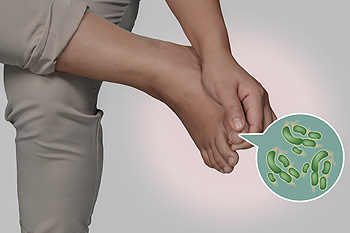 A fungal infection that develops in the skin of the feet, which may be referred to as athlete's foot or tinea pedis, often produces discomfort and pain. Probable symptoms may include itching and burning skin in addition to blisters that may form in between the toes. Athlete’s foot is typically caused by a fungus that thrives in warm and dark environments and may spread when the foot touches the contaminated area. This type of fungus often lives in public showers and pools, and may be prevented from spreading by wearing appropriate shoes in these areas. If you are affected by this condition, it may be beneficial to wash your feet often followed by thoroughly drying in between the toes. If your socks should become wet from excess moisture, it’s important to change them frequently in addition to wearing cotton socks which may aid in absorbing additional perspiration. For severe infections, a consultation with a podiatrist is advised for more aggressive treatment options
A fungal infection that develops in the skin of the feet, which may be referred to as athlete's foot or tinea pedis, often produces discomfort and pain. Probable symptoms may include itching and burning skin in addition to blisters that may form in between the toes. Athlete’s foot is typically caused by a fungus that thrives in warm and dark environments and may spread when the foot touches the contaminated area. This type of fungus often lives in public showers and pools, and may be prevented from spreading by wearing appropriate shoes in these areas. If you are affected by this condition, it may be beneficial to wash your feet often followed by thoroughly drying in between the toes. If your socks should become wet from excess moisture, it’s important to change them frequently in addition to wearing cotton socks which may aid in absorbing additional perspiration. For severe infections, a consultation with a podiatrist is advised for more aggressive treatment options
Athlete’s foot is an inconvenient condition that can be easily reduced with the proper treatment. If you have any concerns about your feet and ankles, contact one of our podiatrists from Carolina Foot & Ankle. Our doctors will treat your foot and ankle needs.
Athlete’s Foot: The Sole Story
Athlete's foot, also known as tinea pedis, can be an extremely contagious foot infection. It is commonly contracted in public changing areas and bathrooms, dormitory style living quarters, around locker rooms and public swimming pools, or anywhere your feet often come into contact with other people.
Solutions to Combat Athlete’s Foot
Athlete’s foot can cause many irritating symptoms such as dry and flaking skin, itching, and redness. Some more severe symptoms can include bleeding and cracked skin, intense itching and burning, and even pain when walking. In the worst cases, Athlete’s foot can cause blistering as well. Speak to your podiatrist for a better understanding of the different causes of Athlete’s foot, as well as help in determining which treatment options are best for you.
If you have any questions please feel free to contact one of our offices located in Huntersville Office | 16419 Northcross Dr Suite A, Huntersville, NC 28078; Mooresvillle Office | 206 Joe Knox Avenue Suite D, Mooresville, NC 28117; and Mountain Island | 10310 Couloak Drive Suite 200, Charlotte, NC 28216 . We offer the newest diagnostic and treatment technologies for all your foot and ankle needs.
 Hammertoe may often be the result of a muscle imbalance in the toes. It is typically a painful and uncomfortable foot condition and is generally caused by wearing poorly fitting shoes or an inherited trait. If high heels are frequently worn, the toes may be crammed into an area that may be too small for the toes to move about in. When this happens, the toes may be forced into a flexed position for long periods of a time. If this condition is not treated promptly, they may permanently remain in a bent position, which may require surgery to repair. Additionally, a toe that has been stubbed or broken may be a cause of hammertoe. Other foot conditions such as corns and calluses may develop on top of the toes as a result of hammertoe. If you feel you have hammertoe, it is strongly suggested to speak to a podiatrist who can suggest proper techniques for a successful treatment.
Hammertoe may often be the result of a muscle imbalance in the toes. It is typically a painful and uncomfortable foot condition and is generally caused by wearing poorly fitting shoes or an inherited trait. If high heels are frequently worn, the toes may be crammed into an area that may be too small for the toes to move about in. When this happens, the toes may be forced into a flexed position for long periods of a time. If this condition is not treated promptly, they may permanently remain in a bent position, which may require surgery to repair. Additionally, a toe that has been stubbed or broken may be a cause of hammertoe. Other foot conditions such as corns and calluses may develop on top of the toes as a result of hammertoe. If you feel you have hammertoe, it is strongly suggested to speak to a podiatrist who can suggest proper techniques for a successful treatment.
Hammertoes can be a painful condition to live with. For more information, contact one of our podiatrists of Carolina Foot & Ankle. Our doctors will answer any of your foot- and ankle-related questions.
Hammertoe
Hammertoe is a foot deformity that occurs due to an imbalance in the muscles, tendons, or ligaments that normally hold the toe straight. It can be caused by the type of shoes you wear, your foot structure, trauma, and certain disease processes.
Symptoms
Risk Factors
Treatment
If you have hammertoe, you should change into a more comfortable shoe that provides enough room for your toes. Exercises such as picking up marbles may strengthen and stretch your toe muscles. Nevertheless, it is important to seek assistance from a podiatrist in order to determine the severity of your hammertoe and see which treatment option will work best for you.
If you have any questions, please feel free to contact one of our offices located in Huntersville Office | 16419 Northcross Dr Suite A, Huntersville, NC 28078; Mooresvillle Office | 206 Joe Knox Avenue Suite D, Mooresville, NC 28117; and Mountain Island | 10310 Couloak Drive Suite 200, Charlotte, NC 28216 . We offer the newest diagnostic and treatment technologies for all your foot care needs.